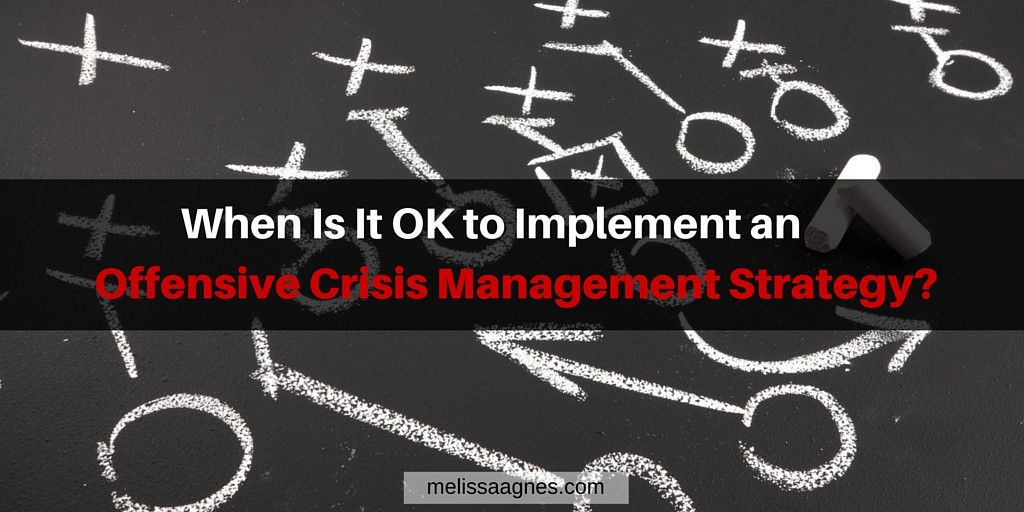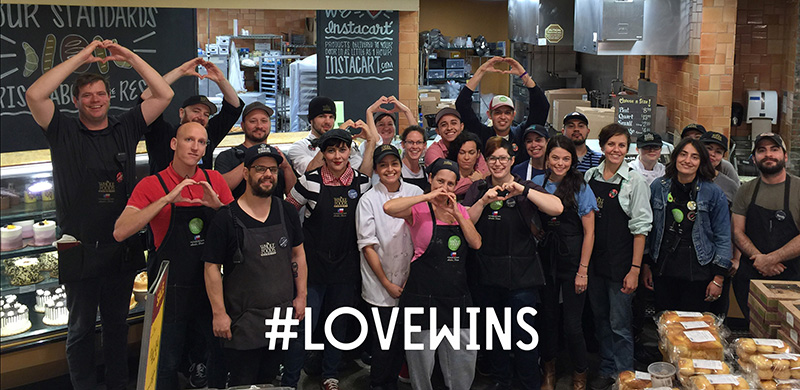
What is the goal of crisis management?
The goal of crisis management is to salvage your organization’s reputation and bottom line when presented with a bad or threatening situation – or so says the majority of people.
But you and I, we’re not the majority of people, are we? We therefore know that the truth is that exceptional crisis management – the kind your organization should always strive to achieve – has a much stronger goal. The goal is to not just salvage your brand and reputation, but to find your organization in a better position post-crisis, than it was prior to the crisis ever occurring.
So ultimately, your goal is to come out of a crisis with a stronger, deeper connection with your stakeholders, because you proved (with your actions) to put them first and to do the right thing when times got tough. This is the goal that keeps me passionate about my job and the work I do with my clients.
So with this goal in mind, I’d like to raise the following question:
When is it OK to go on the offensive with your crisis management?
Before we aim to answer this question, let’s first define what I mean by “going on the offensive”.
If you Google “offense,” the definition Google provides you with is:
“the action of attacking”
This is a good way to define what I mean by an offensive crisis management strategy.
In other words, it means that you don’t just aim to resolve the situation with your brand in tact, but that you resolve to fight back. Often, organizations choose to implement this type of crisis management strategy to make a statement – the statement being that they won’t be accepting or taking any crap.
The situation that Whole Foods Market has most recently found themselves in is a perfect example of this.
Whole Foods Market’s offensive crisis management strategy
Briefly put, a pastor recently posted a video and filed a lawsuit against Whole Foods for allegedly selling him a cake with a anti-gay slur written on it. The pastor, whose name is Jordan Brown, claims that he ordered a cake and requested that the words “Love Wins” be written across it. After purchasing the cake and leaving the store, Brown says that he opened the box to learn that the cake read “Love Wins Fag”. With this revelation, Brown decided to publish a video calling Whole Foods out on the discriminatory cake, and to file a lawsuit against the organization.
Whole Foods, which has been the topic of several controversies over the past short while, responded by publishing a statement that refutes Brown’s claim, stating that the accusations are fraudulent – and why. They also published video footage from their store’s surveillance cameras that they say proves that Brown’s claims are in fact fraudulent.
This statement and the video footage that Whole Foods published was an excellent crisis management response. The timeliness of their response proved that they took the situation seriously (which in itself is already better than their recent crisis management of other issues) and their statement provided all the right information to prove their point, including a picture of their staff that added a nice human touch and implemented #lovewins as a positive, supportive hashtag, as seen below:
 Image credit: Whole Foods Market – Team Members, Whole Foods Market Lamar Store, Austin, TX
Image credit: Whole Foods Market – Team Members, Whole Foods Market Lamar Store, Austin, TX
This was a great response and, in itself, would have been sufficient. Especially since people were already skeptical about Brown’s accusations, take a look:
Pretty skeptical about the Whole Foods cake slur. At least in pictures, icing tip appears to be thinner, handwriting different. YMMV.
— Megan McArdle (@asymmetricinfo) April 19, 2016
Additionally, it was revealed that Brown is also being sued for $27,000 for defaulting on a student loan, which had people speculating that the lawsuit he filed against Whole Foods was a wrongful attempt to get himself out of debt.
So, so far, Whole Foods Market’s crisis response is extremely strong and nothing about it is offensive. But Whole Foods didn’t stop there. In addition to their statement and its proof, Whole Foods announced that they will be taking “legal action against both Mr. Brown and his attorney” in the amount of $100,000 for defamation. (For more on this story, click here.)
So the big question is…
Was the countersuit for defamation – which was the part of Whole Foods’s crisis management that was offensive – taking it too far?
Whole Foods has been the target of several attacks lately, and it’s understandable that they’re fed up and want to say “enough is enough”. It’s also important for them to protect their stakeholders, including their employees, and their reputation. However, with a brilliant response and proof to back it up, along with the skepticism that people already had towards Brown’s claims, did they really need to sue Brown?
While you don’t want to be a push-over and allow your brand’s reputation to be wrongfully dragged through the mud, you also don’t want to be perceived as having a hot head and taking things too far (crisis management overkill, if you will). Both can bite you. Crisis management needs to be about finding the right balance – and always putting (and proving that you put) your stakeholders first.
In my opinion, Whole Foods’s response without the countersuit was sufficient. In addition, for an organization that is tired of seeing their name in headlines in association with negativity, the choice of a countersuit was counterintuitive. Had they published their statement, video and picture and left it at that, the issue would have been managed and the story would soon be forgotten. Now, however, whenever there is an update on the countersuit, the story will be brought back up and published about.
So with all of this said…
When is the right time to implement an offensive crisis management strategy?
The answer is: when you absolutely need to. If your brand has been wronged to a point of irreparable or long-lasting damage, then yes, you should absolutely consult with an attorney and do what you need to do to protect your business. But it’s important to not make this decision hastily or to come across as a corporate bully (i.e.: a David and Goliath type situation). Oftentimes, it’s better to respond appropriately, prove yourself, let your community come to your defence and then continue to move forward.
When it comes to crisis management, you always want to focus on taking a positive approach and building/strengthening those relationships with your stakeholders and community. You should seek, first and foremost, to find positive opportunities, rather than implementing an aggressive or negative strategy – especially one that will be long-lasting when the situation could have otherwise been put to bed and forgotten about.
What are your thoughts on the subject?
Image credit: cvm/shutterstock.com

Author of Crisis Ready: Building an Invincible Brand in an Uncertain World, Melissa Agnes is a leading authority on crisis preparedness, reputation management, and brand protection. Agnes is a coveted keynote speaker, commentator, and advisor to some of today’s leading organizations faced with the greatest risks. Learn more about Melissa and her work here.

Good article. Why should we settle for “defense” as an organization? I agree that the organization never needs to be perceived as a bully, but it is important that they are also not considered an easy soft target. Part of your best defense is a good offense. Love your blogs!
Hi Jim,
I mentioned this in the blog post, but added that it is a fine line that needs to be weighed carefully. “Your best defense is a good offense” is a good quote, though shouldn’t necessarily be taken literally for its direct meaning when it comes to organizational crisis management. A best offense for organizations should mean / be taken to implement strong issues management and prevention on a regular basis. This is the best offense for crisis management – rather than attacking those who are upset with your company! (But again, as I said in the post, there is a line to be drawn on both sides.)
Insightful write up – it is not in the best interest for an organisation, with all resources to defend itself with, to go on the defensive against a member of its society, apparently with limited resources and a debt to look after. It will always be perceived as bully – not so good at such precarious times. (remind me of the Mc – Liberal). Yes sufficient and exacting its response is enough.
Nip it in the bud. Push back right out of the gate. I applaud the actions of Whole Foods. The pastor committed a serious crime against their company. Instead of doing nothing or doing too little, they let him have it right back. And since they had truth on their side (and evidence to back it up), they were right to run with it.
I have no issue with the countersuit, but feel the amount is arbitrary. The company has obviously incurred substantial costs to investigate and publicly defend itself, it is fair for them to recoup those expenses. My thought is that the exact amount was not $100,000, which, without knowing additional detail….seems a little excessive. Great topic.
I’m loving all of these comments and opinions. Thanks for sharing!